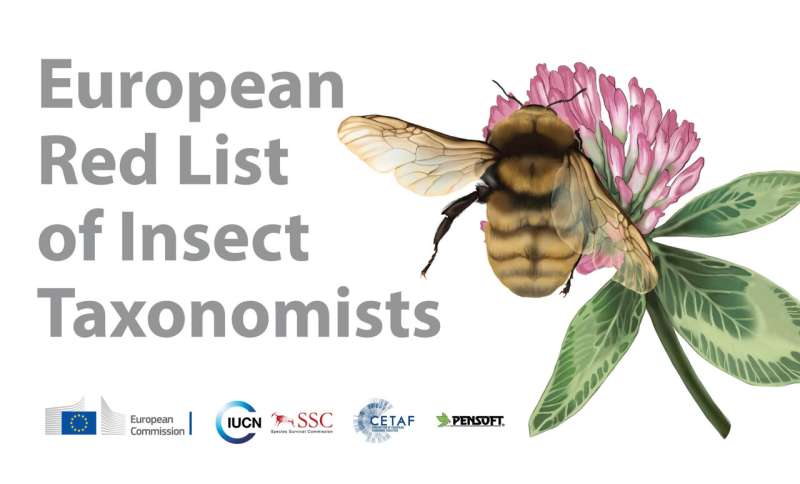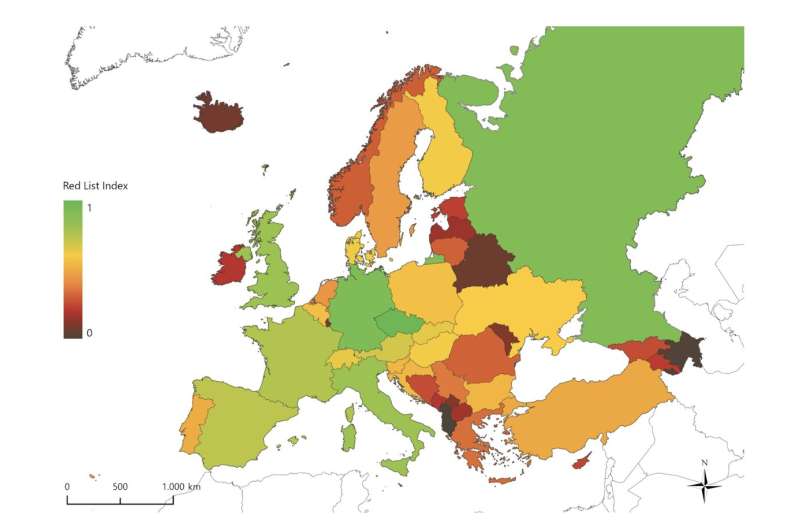European Red List of Insect Taxonomists, cover. Illustration: Fragrant Bumble Bee (Bombus fragrans) by Denitsa Peneva. Credit: Denitsa Peneva
While insect populations continue to decline, taxonomic expertise in Europe is at serious risk, confirms data obtained within the European Red List of Insect Taxonomists, a recent study commissioned by the European Union (EU).
Scientists who specialize in the identification and discovery of insect species—also known as insect taxonomists—are declining across Europe, highlights the newly released report by CETAF, International Union for Conservation of Nature (IUCN) and Pensoft. The authors of this report represent different perspectives within biodiversity science, including natural history and research institutions, nature conservation, academia and scholarly publishing.
Despite the global significance of its taxonomic collections, Europe has been losing taxonomic expertise at such a rate that, at the moment nearly half (41.4%) of the insect orders are not covered by a sufficient number of scientists. If only EU countries are counted, the number looks only slightly more positive (34.5%). Even the four largest insect orders: beetles (Coleoptera), moths and butterflies (Lepidoptera), flies (Diptera) and wasps, bees, ants and sawflies (Hymenoptera) are only adequately "covered" in a fraction of the countries.
To obtain details about the number, location and productivity of insect taxonomists, the team extracted information from thousands of scientific articles published in the last decade, queried the most important scientific databases and reached out to over fifty natural science institutions and their networks.
Furthermore, a dedicated campaign reached out to individual researchers through multiple communication channels. As a result, more than 1,500 taxonomists responded by filling in a self-declaration survey to provide information about their personal and academic profile, qualification and activities.
Then, the collected information was assessed against numerical criteria to classify the scientists into categories similar to those used by the IUCN Red List of Threatened Species.
In the European List of Insect Taxonomists, these range from Eroded Capacity (equivalent to Extinct) to Adequate Capacity (equivalent to Least Concern). The assessment was applied to the 29 insect orders (i.e. beetles, moths and butterflies, etc.) to figure out which insect groups the society, conservation practitioners and decision-makers need not be concerned at this point.
On a country level, the results showed that Czechia, Germany and Russia demonstrate the most adequate coverage of insect groups. Meanwhile, Albania, Azerbaijan, Belarus, Luxembourg, Latvia, Ireland and Malta turned out to be the ones with insufficient number of taxonomists.
In most cases, the availability of experts seems to correlate to GDP, as wealthiest countries tend to invest more in their scientific institutions. What is particularly worrying is that the lack of taxonomic expertise is more evident in the countries with the greatest species diversity. This trend may cause even more significant problems in the knowledge and conservation of these species, further aggravating the situation. Thus, the report provides further evidence about a global pattern where the countries richest in biodiversity are also the ones poorest in financial and human resources.
The research team also reminds that it is European natural history museums that host the largest scientific collections—including insects—brought from all over the globe. As such, Europe is responsible to the world for maintaining taxonomic knowledge and building adequate expert capacity.
Other concerning trends revealed in the new report are that the community of taxonomists is also aging and—especially in the older groups—male-dominated (82%).
Overview of the taxonomic capacity in European countries based upon the Red List Index (colour gradient goes from red (Eroded Capacity) to green (Adequate Capacity). Credit: European Red List of Taxonomists consortium
"One reason to have fewer young taxonomists could be due to limited opportunities for professional training (...), and the fact that not all professional taxonomists provide it, as a significant number of taxonomists are employed by museums and their opportunities for interaction with university students is probably not optimal." comments Ana Casino, CETAF's Executive Director.
"Gender bias is very likely caused by multiple factors, including fewer opportunities for women to be exposed to taxonomic research and gain an interest, unequal offer of career opportunities and hiring decisions," according to the authors. "A fair-playing field for all genders will be crucial to address these shortcomings and close the gap."
The European Red List of Taxonomists concludes with practical recommendations concerning strategic, science and societal priorities, addressed to specific decision-makers. The authors give practical examples and potential solutions in support of their call to action.
For instance, in order to develop targeted and sustainable funding mechanisms to support taxonomy, they propose the launch of regular targeted Horizon Europe calls to study important insect groups for which taxonomic capacity has been identified to be at a particularly high risk of erosion.
To address specific gaps in expertise—such as the ones reported in the publication from Romania—a country known for its rich insect diversity, yet poor in taxonomic expertise—the consortium proposes the establishment of a natural history museum or entomological research institute that is well-fitted to serve as a taxonomic facility.
Amongst the scientific recommendations, the authors propose measures to ensure better recognition of taxonomic work at a multidisciplinary level. The scientific community, including disciplines that use taxonomic research, such as molecular biology, medicine and agriculture—need to embrace universal standards and rigorous conduct for the correct citation of scientific publications by insect taxonomists.
Societal engagement is another important call. "It is pivotal to widely raise awareness of the value and impact of taxonomy and the work of taxonomists. We must motivate young generations to join the scientific community" points Prof. Lyubomir Penev, Managing Director of Pensoft.
"Understanding taxonomy is a key to understanding the extinction risk of species. If we strategically target the gaps in expert capacity that this European Red List identifies, we can better protect biodiversity and support the well-being and livelihoods of our societies. With the climate crisis at hand, there is no time left to waste," added David Allen from the IUCN Red List team.
"As a dedicated supporter of the IUCN Red List, I am inspired by this call to strengthen the capacity, guided by evidence and proven scientific methods. However, Europe has much more scientific capacity than most biodiversity-rich regions of the world. So, what this report particularly highlights is the need for massively increasing investment in scientific discovery, and building taxonomic expertise, around the world," said Jon Paul Rodríguez, Chair of the IUCN Species Survival Commission.
More information: Report: European Red List of insect taxonomists
Provided by Pensoft Publishers

























